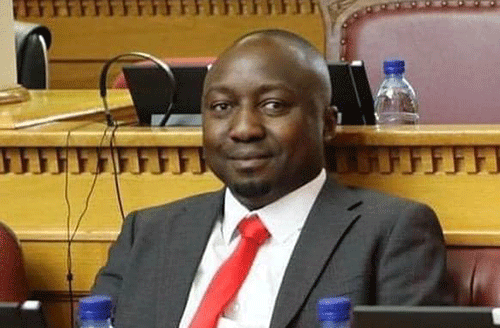Loide Jason
Aletta Shikololo
Popular Democratic Movement’s member of parliament Hidipo Hamata on Wednesday gave a notice of question to home affairs minister Albert Kawana on the issue of the visa-free courtesy to Chinese citizens arriving in Namibia for 30 days.
A local daily newspaper on Tuesday reported that Kawana has proposed a visa exemption for Chinese nationals arriving in Namibia.
Hamata said, in essence, visa exemption is a symbol of trust between two countries.
“However, the Namibian government extending a visa-free courtesy to Chinese citizens arriving in Namibia for a period of 30 days would not be fair if the same privilege is not extended to Namibian citizens arriving in China,” he said.
But the Chinese ambassador to Namibia, Zhao Weiping, said recent reports misrepresented the facts. Speaking at a press conference on Wednesday, Weiping stated that these claims are false and have been misinterpreted.
The ambassador also criticised politicians for their remarks on the matter.
He suggested that these politicians might be exploiting the situation for their own political gain, making statements that lack factual basis.
“Some politicians have made irresponsible statements regarding this matter, and it appears that some of them are merely seeking to gain cheap political points,” Weiping remarked.
Weiping clarified that discussions regarding visa exemptions between the two countries were indeed initiated in 2019.
However, due to the impact of the Covid-19 pandemic, these discussions were postponed. He emphasised that the process has not been characterised by any rush or urgency, contrary to how it was portrayed in the report.
“The ongoing discussions on visa exemptions are mutually beneficial for both nations,” he said.
It is believed that Kawana’s proposal is included in a letter, dated 22 May, which he wrote to the ministers of labour, titled ‘Proposed Exemption of Visa Requirements Between the Government of the Republic of Namibia and the Government of the People’s Republic of China for Holders of Diplomatic, Official, Service, Public Affairs and Ordinary Passports’.
Regarding that, Hamata wants to know if the visa exemption is bilateral or unilateral. He further sought clarity if there are reasons to believe that citizens of Namibia might overstay or cause harm in China, thereby making a mutual visa-free agreement unlikely.
“Minister Kawana, what specific conditions and terms are included in the proposed visa exemption agreement between Namibia and China?”
He continued. “What are the concerns raised by officials in the home affairs ministry regarding the relationship between senior ministry officials and the Chinese government, particularly about potential disadvantages for Namibia?”
Hamata queried Kawana about how the relationship between senior ministry officials and the Chinese government was established, and the concerns about potential conflicts of interest.
“What evidence exists to support the claim that the negotiations between Namibia and China regarding the visa exemption were kept secret by officials in the immigration ministry?” he asked.
Weiping highlighted that as of February this year, China has signed visa exemption agreements with 152 countries. Among these agreements, 134 countries have granted mutual visa exemptions for diplomatic or official passport holders, while 18 countries have established mutual exemptions for all passport holders.
Hamata also wanted Kawana to explain why he believes the visa exemption move is in the best interest of the country.
Kawana is expected to answer the questions next week in the National Assembly.


